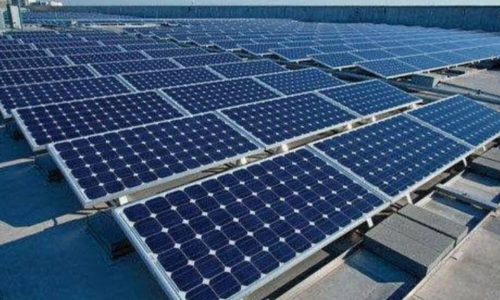An Overview of Industrial Hybrid Solar Systems
Eka Synergy Solar Systems is a leading dealer and distributor of industrial hybrid solar systems. An Industrial Hybrid Solar System combines the best of on-grid and off-grid solar power solutions. By integrating solar energy with other sources such as the grid or diesel generators, it ensures flexibility and uninterrupted power for industrial operations. This system not only helps reduce energy costs but also guarantees reliable power supply, making it a perfect solution for industries that demand continuous power even during grid failures.
Understanding the Functionality of a Hybrid Solar System
Hybrid Solar Panels: Harness sunlight to generate DC electricity efficiently.
Hybrid Solar Inverter: The inverter transforms DC electricity into AC power, enabling the operation of industrial machines and equipment efficiently.
Battery Storage: Surplus energy generated by hybrid solar systems during peak sunlight hours is stored in batteries for later use, ensuring power availability during nighttime or grid outages.
Grid and Diesel Backup: In cases where solar power or stored energy falls short, hybrid solar systems can seamlessly switch to the grid or a backup generator, ensuring uninterrupted industrial operations.

Key Features and Components of Industrial Hybrid Solar Systems
Solar Panels
Inverters
Batteries
Energy Management System (EMS)
Hybrid Controller
Monitoring System
Advantages of Implementing Industrial Hybrid Solar Systems
Reduced Energy Bills
Continuous Power Supply
Environmental Benefits
Energy Independence
Optimized Performance
Uses and Applications of Industrial Hybrid Solar Systems
Manufacturing plants
Warehouses
Textile industries
Food processing plants
Mining and construction sites
Oil and gas facilities
Automotive industries
Specifications for a Standard Industrial Hybrid Solar System
Solar Capacity
50 kW to 1 MW, depending on the energy needs of the facility.
Battery Capacity
100 kWh to 500 kWh (expandable based on requirements)
Inverter Rating
50 kW to 500 kW, depending on the system size.
Peak Efficiency
97-99% efficiency for inverters and solar modules
Energy Storage Type
Lithium-ion or advanced lead-acid batteries.
Backup Generator Compatibility
Integrated diesel or natural gas generators can be used for backup power.
Monitoring
Real-time monitoring with performance data, accessible remotely via a web platform or mobile app.
Financial and Environmental Benefits of Industrial Hybrid Solar Systems
Cost Savings:
The upfront investment in hybrid solar systems can be recovered through energy bill savings within 5-7 years. With significant long-term cost reductions, especially in areas with high grid electricity costs, hybrid solar is a smart investment for industries.
Return on Investment (ROI)
Based on the scale of the hybrid solar system and energy requirements, industries can anticipate an annual ROI of approximately 10-20%.
Carbon Footprint Reduction
By adopting hybrid solar systems, industries can reduce their CO2 emissions by 30-50%, significantly contributing to sustainable development goals.
Other Types Industrial Solar Systems
We offer a range of customizable solar systems that are suited to the varying needs of industrial operations, ensuring that every system is designed to meet specific power requirements.
On-Grid Solar Systems
Ideal for industries with high energy demands looking to reduce their electricity costs while staying connected to the main power grid. These systems allow businesses to offset their energy consumption and send any excess energy back to the grid for potential credits.Benefits:
- Lower electricity bills by utilizing solar power
- Ability to export surplus energy back to the grid
- Minimal maintenance and seamless integration with existing infrastructure
Off-Grid Solar Systems
Perfect for industries operating in remote locations where grid access is limited or unreliable. Off-grid systems offer complete energy independence, ensuring a steady power supply with the help of battery storage, even during outages or off-peak sunlight hours.Benefits:
- Full autonomy from the grid, ensuring uninterrupted power
- Tailored energy solutions based on specific operational needs
- Reliable battery storage to maintain power availability around the clock


